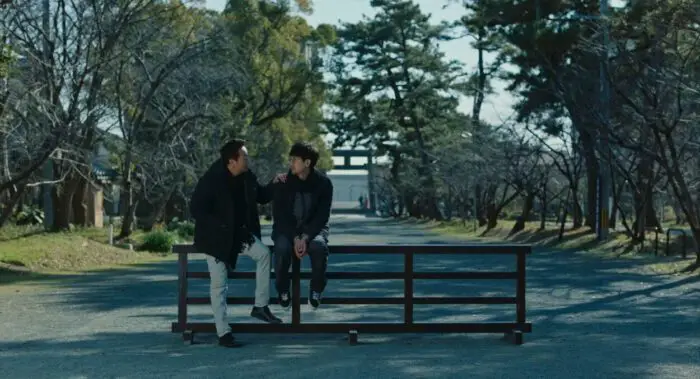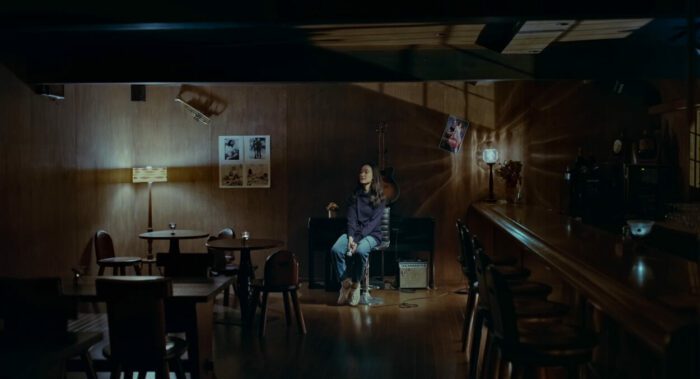Yanagawa, the latest film from celebrated director Zhang Lu, begins with bad news: Li Dong (Luyi Zhang) is diagnosed with stage four cancer, a diagnosis he shares only with a stranger outside the hospital. What, with months to live, does one do? How does one live? Who does one see? In this ethereal, contemplative drama, Li Dong returns to Beijing to visit his older brother—without sharing his diagnosis—and convinces him to travel with him to the Japanese city of the film’s name, where they together will seek out a childhood sweetheart.
Dong and his brother Li Chun (Bai Qing Xin) are opposite in many ways. Dong is quiet, contemplative, reserved, and thoughtful, yet also resolute and determined. Older brother Chun, meanwhile, is loud, brash, impulsive, and extroverted, at least in comparison. The two share an extended conversation over drinks in a Japanese restaurant in Beijing, where Dong hides news of his diagnosis and instead obliquely prepares Chun to inherit the family home. Yanagawa is a film about putting one’s affairs, so to speak—both material and personal—in order. And so Chun also prompts the two to travel to Yanagawa.

The port city of Yanagawa is known as “The Venice of Kyushu” for its own intricate web of canals. Lu’s depiction of the seaside city isn’t much romanticized, though: his is a quiet, often nearly empty maze of streets and canals whose silent gondoliers pilot their craft as silent, stealthy conveyances. These canals are one of Yanagawa’s cross-cultural spaces; its bars are another, where immigrants, travelers, and natives bond over a music that is equally international. And there is where the two mostly-estranged brothers find the object of their childhood affection.
Liu Chuan (played by Ni Ni, one of Asia’s top actors, best known for her collaboration with Zhang Yimou in The War Flowers) sings folkie covers of John Lennon songs—mostly his Imagine-era odes to Yanagawa’s own Yoko Ono, perhaps the city’s most famous citizen and one who became, herself, wife to Beatle, a complex, oft-reviled and unfairly-maligned icon of cross-cultural relations (and one who just celebrated her 90th birthday). “Oh My Love” (credited to Lennon-Ono) and “Oh Yoko” (to Lennon, solo) from Lennon’s 1971 no. 1 solo release are songs of tender, unaffected beauty and something of a muse for the equally-cosmopolitan Chuan, a never-married trilingual London expatriate who now seems settled in Yanagawa.

And as if the three had never parted decades ago, Dong, Chun, and Chuan fall quickly back into the patterns we are to assume characterized their youth. The self-effacing Dong yields to his older brother, who cannot imagine that Chuan might have preferred Dong to himself; after all, Chun seems to believe, it is he who is the one with charisma, with charm. But for the most part, Chun’s rough appeal is lost on Chuan, who prefers the quiet spaces and introspective conversations of the younger brother.
Meanwhile, there is a third man vying for Chuan’s affections: her Japanese landlord (Sôsuke Ikematsu, who starred in Killing and the Cannes Palme d’Or winner Shoplifters). He, however, struggles to communicate with her as they converse in English, a language in which she is far more fluent than he. These kinds of linguistic barriers and challenges are key to Yanagawa‘s expression: Dong and Chuan both left their childhood homes and their native language with them. Chun represents more of a isolationist, little traveled and largely uninterested in the world around him.
The use of Lennon and Ono’s music as a motif inspires the film in another way. Together, the two preached a message of worldwide peace and love. Chuan and Dong especially seem still inspired by that message: theirs is a beatific, calm, and forgiving relationship, accepting of each other for what—and who—they are, while the more aggressive, domineering Chun seems unable to understand either of them. Kazuo Ishiguro, whom Dong reads and Chuan claims to have known, is another notable influence, a cross-cultural export like Ono born in Japan whose work was well known in and part of the Western world.
In its measured pace and stately tone, Yanagawa channels the domestic dramas of Yasujirō Ozu, whose camera rarely moved, even for long stretches, and whose scripts betrayed meaning far deeper than the simple words spoken. If Zhang allows his camera a little more freedom than Ozu’s static tatami shots and his actors a little more elbow room to move about the screen, there is nonetheless a prevailing sense of still and calm, a wisdom that pervades even the characters’ more superficial words and actions.
Written and directed by Zhang Lu and starring Ni Ni, Luyi Zhang, Bai Qing Xin, Sôsuke Ikematsu, and Ryôko Nakano, Yanagawa opens exclusively on the Film Movement Plus streaming service in North America on February 24, 2023. In Chinese and Japanese with English Subtitles.



